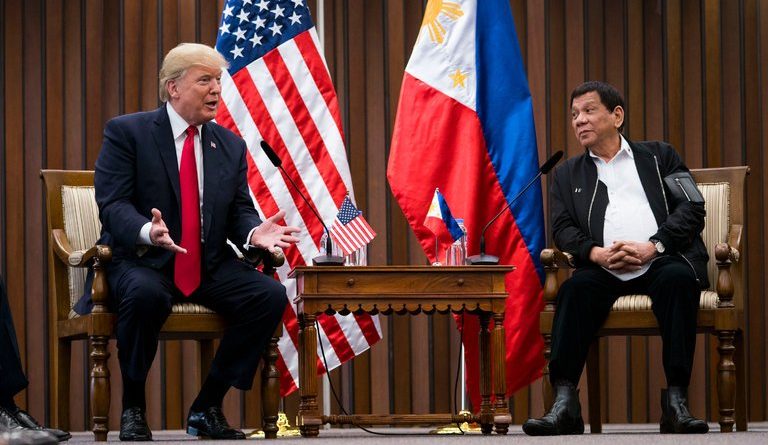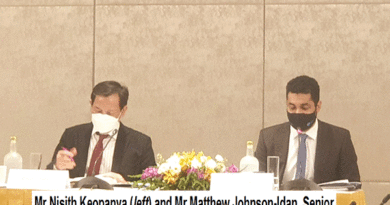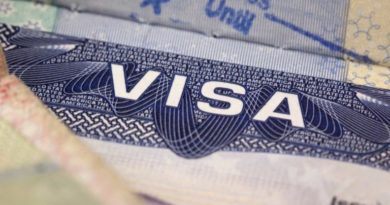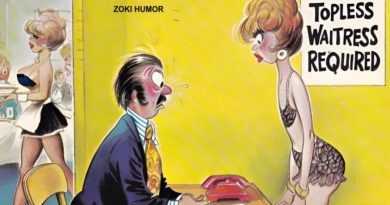US & Canada: Manila – A Trump Lauds ‘Great Relationship’ With Duterte in Manila
.
MANILA — President Trump said on Monday that he had a “great relationship” with President Rodrigo Duterte of the Philippines, making little mention of human rights at his first face-to-face meeting with an authoritarian leader accused of carrying out a campaign of extrajudicial killings in his nation’s war on drugs.
In a stark break from past practice by American presidents, who have pressed foreign leaders publicly and privately about allegations of human rights abuses, Mr. Trump instead pursued his own transactional style of diplomacy, dwelling mostly on areas of common ground during his meeting with Mr. Duterte. On the sideline of the Association of Southeast Asian Nations summit meeting, Mr. Trump focused on combating the Islamic State and illegal drugs as well as on trade issues, the White House said.
“Human rights briefly came up in the context of the Philippines’ fight against illegal drugs,” said Sarah Huckabee Sanders, the White House press secretary.
But Mr. Duterte’s spokesman denied that the subject of rights was ever broached, even as the Philippine president spoke about the “drug menace” in his country.
Mr. Trump “appeared sympathetic and did not have any official position on the matter and was merely nodding his head, indicating that he understood the domestic problem that we faced on drugs,” said Harry Roque, Mr. Duterte’s spokesman. “The issue of human rights did not arise; it was not brought up.”
Continue reading the main story
The meeting also highlighted the potential conflicts of interest inherent in Mr. Trump’s position as both a president and a global real estate developer. Among those at the private session was Jose E. B. Antonio, a developer who is Mr. Trump’s partner on a $150-million, 57-story luxury tower in Manila’s financial district and also serves as Mr. Duterte’s trade envoy to the United States.
The two presidents declined to answer questions during brief remarks to reporters at the start of the meeting. As they sat side by side, Mr. Trump and Mr. Duterte projected a friendly dynamic, ribbing members of the news media as they prepared to speak privately.
“We’ve had a great relationship,” Mr. Trump said, heaping praise on Mr. Duterte’s stewardship of the summit, including an elaborate gala dinner on Sunday where they were seen chatting animatedly and a set of cultural performances on Monday. “This has been very successful.”
As journalists shouted questions about whether Mr. Trump would press Mr. Duterte on human rights, the Philippine president quickly silenced them.
“Whoa, whoa — this is not the press statement,” Mr. Duterte said. “We are in a bilateral meeting.”
“You are the spies,” he told the reporters, as Philippine security personnel jostled some of them roughly. The remarks elicited a hearty laugh from Mr. Trump before the journalists were led out of the room.
Mr. Roque later said Mr. Trump focused during the roughly 40-minute session on concerns about tariffs being imposed on American vehicles but not Japanese cars. Mr. Duterte, for his part, thanked the United States for its help in dealing with the conflict in Marawi, the southern city where Philippine forces clashed with militants trying to seize territory.
On the streets of Manila, meanwhile, a phalanx of about a hundred riot police officers with shields and truncheons clashed Monday with about 300 protesters as they marched near the American Embassy.
The protesters carried anti-American placards and a likeness of Mr. Trump with a Hitler-like mustache. They were later pushed back with water cannons.
White House officials have said that Mr. Trump has a “warm rapport” with Mr. Duterte, with whom he has spoken and exchanged letters since taking office, and that he wants to mend the American-Philippine alliance after strains during the Obama administration.
“President Trump specifically said he has always been a friend of the Duterte administration, unlike the previous administrations of the United States,” Mr. Roque said on Monday. “He stressed that he can be counted upon as a friend of the Duterte administration.”
Mr. Trump raised eyebrows in April by inviting Mr. Duterte to the White House during what American officials called a “very friendly conversation” on the phone in which the president praised the Philippine leader’s efforts to rid his country of drugs.
Mr. Duterte has been accused of ordering thousands of extrajudicial killings of drug suspects in what human rights groups condemn as a bloody campaign that has targeted many who may have nothing to do with narcotics.
On Sunday evening, he made a public show of his affection for Mr. Trump, grabbing a microphone during the gala dinner to sing the Philippine love ballad “Ikaw,” a serenade he said he had performed “upon the orders of the commander in chief of the United States.” A Philippine official later tweeted about the song, reportedly a favorite of Mr. Duterte’s, which includes the lyric, “You are the love I’ve been waiting for.”
Mr. Trump’s encounter earlier in the day with Prime Minister Malcolm Turnbull of Australia was somewhat scratchier, albeit in a mostly playful way. As the two leaders stood alongside Prime Minister Shinzo Abe of Japan, Mr. Trump repeated his vow to eliminate trade deficits that he said the United States ran with “almost everybody.”
“Except us,” Mr. Turnbull interjected.
“Except with you,” Mr. Trump agreed, to titters in the room. “You’re the only one. And if I check it, I’ll probably find out that was …”
“Oh, no,” Mr. Turnbull said. “It’s real.”
The United States, in fact, has run a $10.3 billion trade surplus with Australia in the nine months of this year and has consistently exported more to Australia than it has imported for the last decade.
Since taking office, Mr. Duterte has pivoted away from the United States, a longtime treaty ally, and toward China. The separation took on a more personal flavor before last year’s meeting of the group, known as Asean, in Laos. Then Mr. Duterte used a slur to refer to President Barack Obama when he was asked how he would react if Mr. Obama raised human rights concerns with him. The episode prompted Mr. Obama to cancel a formal meeting with Mr. Duterte at the summit meeting, though the two did talk informally.
Still, Mr. Duterte continued to distance himself, calling for a “separation” between the countries and threatening to scrap an agreement that allows American troops to visit the Philippines.
Trump administration officials have said Mr. Trump wants to improve relations with the Philippines as a bulwark against China’s expansionism in the South China Sea. The Philippines has clashed with China over disputed reefs and shoals in the waterway, which the two countries share, and Mr. Trump has used this month’s Asia tour to offer to, as he said on Sunday in Hanoi, “mediate or arbitrate” such disagreements.
But neither side mentioned the issue in their readouts of the meeting on Monday, and Mr. Duterte has played down the disputes this week, saying that China’s rapidly expanding economy has overtaken that of the United States and that a territorial confrontation would not be worthwhile.
“Today, China is the No. 1 economic powerhouse, and we have to be friends,” Mr. Duterte told Asean leaders on Sunday.
He said that while “the other hotheads” would like confrontation, “the South China Sea is better left untouched.”
“Nobody can afford to go to war,” Mr. Duterte added, including Russia, China, Britain and the United States.









